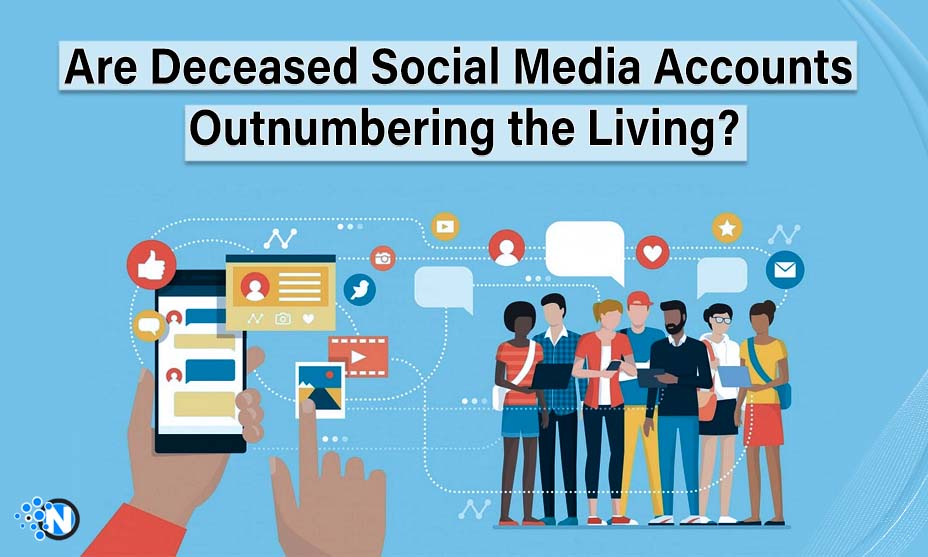Are Deceased Social Media Accounts Outnumbering the Living?

The emergence of social media has completely changed how people communicate and express themselves. These days, our internet presence goes far beyond sporadic posts to become a digital footprint, a carefully edited chronicle of our lives. However, what occurs to this virtual persona if the individual responsible for it dies? In the ever-expanding digital universe, there is a fast-growing population of “deceased social media accounts,” which we will discuss now. This blog post explores the fascinating question: are more deceased people on social media than living people? We will examine the causes of this increase, the opportunities and problems it brings, and the possible prospects for our digital legacies in the future.
The Rise of the Digital Graveyard
The rapid increase in social media users presents a startling image. Social media platforms such as Facebook have billions of active users, and as life expectancy rises worldwide, so does the number of individuals who have passed away. According to ExpressVPN, The U.S. figures stand out in particular, with 659 million deceased accounts expected by 2100, nearly double the country’s population.
There are essential problems raised by this increase in digital ghosts:
- Preserving Memories or Morbid Relics: Social media profiles can act as online monuments where surviving family members can remember and reminisce over the departed. A sense of continuity and connection is fostered by the glimpses into their life provided by photos, updates, and interactions.
- The Emotional Toll of Digital Reminders: For certain people, seeing the social media profiles of departed family members might be upsetting. The grieving process may be hampered by seeing updates stuck in time and serve as a continual reminder of loss.
- The Ethical Dilemma of Data Management: Social media companies hold user data belonging to deceased people. This presents moral questions around data ownership and privacy. Should platforms impose more stringent guidelines on data retention in the event of a death, or should families retain authority over these accounts?
Factors Fuelling the Growth of Deceased Social Media Accounts
Several factors influence the prevalence of deceased social media accounts:
Social Media’s Growing Popularity: The use of social media is gradually increasing in daily life. Sites such as Facebook and Instagram provide a central platform for people to connect, share, and record their experiences.
Absence of Detailed Policies on Death: Many social networking sites lack detailed policies regarding accounts belonging to deceased people. Even while some provide memorialization choices, many accounts stay online long after the user passes away.
The Need for Online Monuments: Thanks to the digital era, there are now more options for remembering. Families and loved ones are using social media to create virtual memorials, which promotes a feeling of grief-sharing and community.
Challenges and Opportunities: Navigating the Digital Afterlife
The surge of deceased social media accounts presents a distinct set of opportunities and difficulties:
Challenges
Privacy Concerns: Data privacy becomes a complicated matter when handling deceased users. Is it appropriate for families to control the internet persona of a loved one who has passed away? How can platforms guarantee the responsible handling of user data?
Effects on Grieving Families Emotionally: Social media sites can be a double-edged sword for bereaved individuals. They can be a constant reminder of loss even while providing a space for connection and memory sharing.
The Authenticity Problem: A departed person’s online presence may grow more artificial as social media algorithms construct feeds. This also continues to facilitate interactions with “friends,” which could impede the grieving process.
Opportunities
Virtual Memorialization: Social media sites can effectively erect enduring monuments. Families can create a space for healing and commemoration by sharing stories, memories, and images through online profiles.
Digital Legacy Management: Technological advancements allow users to control their digital legacy. Platforms might include choices for data transfer, account deactivation, or memorialization in the event of death.
Historical Records and Genealogy: Deceased social media accounts may prove to be essential sources of information for historical knowledge and genealogical inquiry in the future. These platforms provide a singular view into the experiences and lives of people both individually and collectively.

The Future of the Digital Graveyard: Towards a More Compassionate Approach
We need to manage our digital legacies with more consideration and compassion as the number of deceased social media profiles grows. Here are a few possible fixes:
More User Control: Social media companies allow users to leave instructions for their accounts in the event of their death. Users have the option of transferring their accounts to a specified family member, memorializing them, or having them erased.
Better Platform Policies: Families experiencing loss can benefit from guidance and support when clearer and more thorough policies are developed regarding deceased accounts. Platforms may provide tools for data management and account memorialization.
Education and Digital Literacy: Increasing users’ digital literacy can enable them to make knowledgeable decisions about their online presence. This includes how they want it handled after passing.
Conclusion: A Digital Legacy We Shape
One of the most exciting challenges facing the digital age is the proliferation of deceased social profiles. The increasing use of digital platforms in our lives raises essential questions about how we want our digital legacy to be handled after our death. Maintaining a balance between safeguarding privacy, keeping memories alive, and showing compassion for bereaved families is essential. We can traverse the complexity of the digital graveyard and make sure our online footprint represents who we are and how we wish to be remembered through enhanced digital literacy, better platform regulations, and more user control.




